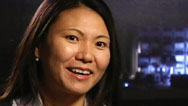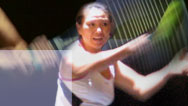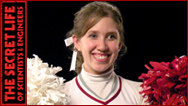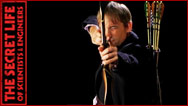Profile: Yoky Matsuoka
- Posted 07.16.08
- NOVA scienceNOW
(This video is no longer available for streaming.) Growing up in Japan, Yoky Matsuoka was on her way to becoming a world-class tennis player. When injuries ended her tennis dreams, she turned to another early interest: robotics. Twenty years later Matsuoka is now a leader in the emerging field of neurobotics, hard at work creating robot technology that can help disabled persons.
Transcript
PROFILE: YOKY MATSUOKA
NEIL DeGRASSE TYSON: Here at NOVA scienceNOW, we've always considered it the epitome of cool to be smart and into science, but sometimes kids think they have to choose between being smart and being popular.
Well, in this episode's profile, you'll meet a popular kid who finally decided to embrace her inner geek, and now she's reaping the rewards.
At age 37, Yoky Matsuoka is finally not afraid to stand out.
At the University of Washington, Yoky is a pioneer in neurobotics, an emerging field that combines neuroscience with building robots. Yoky won the MacArthur "genius" award for this visionary work.
YOKY MATSUOKA: It's easy to describe Star Wars and say, "Remember the scene where Luke goes...and then moves the hand around, and it looks like a real hand, but there's a little door that opens on the arm, and there are all mechanical pieces moving around?" And that's what I make.
NEIL DeGRASSE TYSON: Thanks to her, people who need them will someday have prosthetic hands that will look and move like real human hands. And what makes Yoky's hand so remarkable is that it will be controlled directly by the human brain.
RODNEY BROOKS (Massachusetts Institute of Technology): I don't think Yoky's ever just one of the crowd. She's doing stuff that's very different from what other people are doing, and I think she enjoys being out there on the edge.
NEIL DeGRASSE TYSON: Growing up in Tokyo, Japan, Yoky always knew somewhere, deep down, she was not like other kids.
YOKY MATSUOKA: I knew that I wasn't the same as everybody else. Somehow, something was different.
NEIL DeGRASSE TYSON: Then she found the most unlikely of soul mates.
YOKY MATSUOKA: When I first saw John McEnroe? I bet I was about five or eight. He had a personality that was different from other people. He really stood out. I think that's why he was called the "bad boy" of tennis.
NEIL DeGRASSE TYSON: At age 11, Yoky started playing tennis, too. But as a girl in Japan, she knew she could never be like John McEnroe.
YOKY MATSUOKA: Oh yeah, it's not acceptable to be bold; it's not acceptable to really express your opinions, especially as a girl. I think I was afraid to show that I was different, and I admired people who could show that they are different and not be afraid of it.
NEIL DeGRASSE TYSON: Tennis became Yoky's obsession and her identity. And she was good.
When Yoky was 16, her parents, both former athletes, sent Yoky to the United States, with the hope of her becoming a professional tennis player.
YOKY MATSUOKA: I was really pushing and playing a lot of tennis—maybe three and a half hours of tennis and one hour conditioning every day.
NEIL DeGRASSE TYSON: And at her new high school, in Palm Bay, Florida, she tried hard to fit in. She studied the show Friends for hours on end, to learn English and how to act like the perfect American girl. She even changed the spelling of her name.
YOKY MATSUOKA: My real name was Yoko. And I often got expressions saying, "Oh you're Yoko, just like Yoko Ono." And I changed my last letter from o to y, to "Yoky."
NEIL DeGRASSE TYSON: Yoky was fitting in, but when she began to do well in math and science, she started to stand out in a way she didn't like.
YOKY MATSUOKA: Whenever I received an award, whether it's a science award or a math award, my friends would come over and say, "You got an award, so you are smart?" And then I would say, "No, no. That's just a mistake. I don't know anything about it. I don't know what they're thinking, but since they're going to give me an award, I'll just take it."
It sounded like a geek or a nerd. And I just didn't want to be that. As girls, we all wanted to be accepted as pretty girls or athletic girls, not the science girls or math girls. If people perceived me as an airhead, then that gained my popularity; I get to have cool friends.
NEIL DeGRASSE TYSON: Yoky was so afraid of looking like a nerd that she wouldn't be seen carrying a book.
YOKY MATSUOKA: I even got to the point where I pretended that I was never studying and then just hid in the library for two days before the test, and then I studied. I had to live a double life. I never tried to just stop learning math and science. I just secretly did it.
NEIL DeGRASSE TYSON: On the tennis court, Yoky was on the fast track to becoming a pro. She even reached the qualifying rounds for Wimbledon. But Yoky's body could not withstand the stress.
YOKY MATSUOKA: The first tennis injury, I sprained my ankle so bad that, basically, the bone came off with it. Since then, almost every year I had a pretty severe injury.
I broke my ankle three times, I snapped my Achilles tendon, I snapped my patella tendon, I hurt my back, I had split quad muscles.
NEIL DeGRASSE TYSON: She secretly dreamt of creating a robotic tennis partner to help her strengthen her body and keep training through her injuries.
YOKY MATSUOKA: And I thought, well you know, "I know some science and I know some robotics. Wouldn't that be great, if I can build a robot that, you know, has multiple knobs, and said, âOh today, this person should have this kind of spin on the serve?' Or somebody else, who just would just not miss any balls but would not hit really hard, you know, push me just the right amount every day."
So that's really the first time I started thinking a robotic tennis player would be great.
NEIL DeGRASSE TYSON: Due to injuries, Yoky never played professional tennis. But she did get to build robots. At M.I.T., she studied under the world-famous roboticist, Rodney Brooks.
RODNEY BROOKS: So, in principle, I see no reason that we can't build a robot, eventually, that is as capable as a human being.
NEIL DeGRASSE TYSON: Like John McEnroe, Rodney was known as the bad boy in his world.
YOKY MATSUOKA: Rod is called "bad boy" of robotics because he also has an attitude. He thinks wild ideas that other people won't think of and won't accept.
RODNEY BROOKS: I went around reveling in being different and reveling in telling everyone else they were wrong.
NEIL DeGRASSE TYSON: Rodney was working on Cog, a cutting edge humanoid robot.
YOKY MATSUOKA: Different body parts were up for grab.
"Which body part would you like to work on?" And I said, "Well, you know, I'm a tennis player. I'd really like to understand more about arms and hands. So I think I'm going to work on hands."
RODNEY BROOKS: So this is the hand that Yoky built for her master's thesis. It fit along the end of an arm for Cog.
NEIL DeGRASSE TYSON: It was the first robotic hand that Yoky ever built.
RODNEY BROOKS: Yoky used to always surprise me, because she would go into a field where she knew nothing, really, and within three or four weeks, she'd be knowing everything about it and making contributions there.
NEIL DeGRASSE TYSON: She thrived in this new field, but Yoky was still hiding. She wouldn't even buy books because she was afraid of seeming smart.
YOKY MATSUOKA: Second year of graduate school at M.I.T., I had to put a nametag and it says "Hello my name is," and I was supposed to put "Yoky" on it. But I thought it would be really cool if I put "Airhead." I looked around at everybody's faces, and I didn't see all positive like, "Yeah, girl. Go girl!"
My advisor, Rod Brooks, came and, basically, pulled me on the side and said, "Look, Yoky. This is not going well. Stop acting like an airhead. It's not going to take you far, as long as you're acting this way." And that's the day that it really hit me hard and I thought, "Wow. Now I understand. Okay, I'm going to stop doing this. Acting airhead is not the right dual life that I should be living in anymore." That was one of the few turning points in my life.
NEIL DeGRASSE TYSON: Now, 10 years later, Yoky has her own lab at the University of Washington and is working on a new robotic hand. Except this time, it's a robotic hand for humans.
YOKY MATSUOKA: The hand is really amazing. Hands set us apart from other species. You know we built this society because we can use tools. So that means that people who are disabled and can't use their hands, they're not given back this full human capability. I really want to give that function back to those people.
NEIL DeGRASSE TYSON: Yoky is building a prosthetic hand that will look and move exactly like a real human hand.
BRIAN DELLON (University of Washington): The index finger, for example, has seven muscles. That means we need seven motors to control and make it work exactly like a human finger would. When the motor moves, it pulls these strings, just like a puppet, and the finger will then move in the correct way.
NEIL DeGRASSE TYSON: They use infrared cameras to track exactly how the muscles in the hand move.
BRIAN DELLON: We put reflective markers on an object, say, your finger.
YOKY MATSUOKA: As I move my finger and record the motion itself, I can play that back using my robotic finger.
So if I curl my knuckle joint, then I can make the robot to curl the knuckle joint the same way.
BRIAN DELLON: As you tense and release your muscles, they actually generate electrical activity, and so we're trying to tease out the some of different ways the brain controls our fingers and our muscles, as we're trying to do a certain task.
YOKY MATSUOKA: One day, people are going to be walking around with a prosthetic hand, which...nobody can tell it's prosthetic. It moves like it, it looks like it, it's controlled naturally from the brain. That's how it's going to be.
I really wanted to be somebody who sticks out, be different, have an attitude. If people say, "Hey, you have an attitude," I think, to me, that's a compliment.
NEIL DeGRASSE TYSON: And with her mathematician husband, Simon, Yoky lives this attitude both inside and outside her lab.
YOKY MATSUOKA: I am the first generation who is openly having this dual life and saying, "You know what? I'm not going to wait 'til tenure. I'm going to start having my kids." And it's really exciting, but it's really, really hard.
NEIL DeGRASSE TYSON: Using her MacArthur "genius" award money, Yoky's on a mission to pave the way for the next generation of women in science.
YOKY MATSUOKA: What I really would like to do is to change the image of math and science. And if I could really change that image, then it's okay to be smart. And it's okay to be a girl and then still be able to pursue math and science, and it's accepted.
I'd like to be role model, and I want them to see that that's what I'm doing, and to achieve that and then do better than me.
Credits
Yoky Matsuoka Profile
- Edited by
- Cherry Enoki
- Produced by
- Joshua Seftel & Ann S. Kim
- Directed by
- Joshua Seftel
NOVA scienceNOW
- Executive Producer
- Samuel Fine
- Executive Editor
- Neil deGrasse Tyson
- Senior Series Producer
- Vincent Liota
- Supervising Producers
-
Stephen Sweigart
Joey David - Editorial Producer
- Julia Cort
- Development Producer
- Vinita Mehta
- Senior Editor
- David Chmura
- Online Editor
- Laura Raimondo
- Series Production Assistant
- Fran Laks
- Assistant Editors
-
Susan Perla
Tung-Jen (Sunny) Chiang - Compositors
-
Brian Edgerton
Yunsik Noh - Music
- Rob Morsberger
- NOVA scienceNOW series animation
- Edgeworx
- Associate Producers
-
Cully Gallagher
John Goebel
Daniel Sites
Anna Lee Strachan - Camera
-
John Chater
Austin de Besche
Brian Dowley
Joseph Friedman
Michael Phillips - Sound Recordists
-
Ray Day
Lee Frank
Lisa Johnson
Charlie Macarone
Myron Partman - Sound Mix
- David Chmura
- Animation
-
FIGG Bridge Engineers, Inc.
Anthony Kraus
David Margolies
Sputnik Animation
James LaPlante
Adam Tow - Production Assistants
-
Mona Damluji
Nadira Ilana
Drew Grimes
Elizabeth Stachow - For Lone Wolf Documentary Group
- Executive Producer
- Kirk Wolfinger
- Production Manager
- Donna Huttemann
- For Twin Cities Public Television
- Executive Producer
- Richard Hudson
- Managing producer
- Lynn Winter
- Archival Material
-
Federal Emergency Management Agency
Getty
Internet Moving Images Archive
ITN
Ville Karvinen
Knoxville Zoo
Jan Karel Lameer
The Macaulay Library at the Cornell Lab of Ornithology
NASA
Penn State University Archives, Pennsylvania State University Libraries
Luc de Nil
WCCO-TV - Special Thanks
-
Simon Baker
Aleksander Chernucho
Dennis Kavlakoglu
Libby Lewis Photography
The Methodist Neurological Institute
Museum of Science and Industry
New York Presbyterian Hospital, the University Hospital of Columbia and Cornell and Citigroup Biomedical Imaging Center
Ian Ryan
Phil Schneider
Sahar Salem
Veronica Smith
Francois Thibaut and The Language Workshop for Children
Waite House - Neil deGrasse Tyson
- is director of the Hayden Planetarium in the Rose Center for Earth and Space at the American Museum of Natural History.
- NOVA scienceNOW Consortium Stations
-
Nebraska Educational Telecommunications, NET
Public Broadcasting for Northern California, KQED
Twin Cities Public Television, TPT
Wisconsin Public Television, WPT - NOVA Series Graphics
- yU + co.
- NOVA Theme Music
-
Walter Werzowa
John Luker
Musikvergnuegen, Inc. - Additional NOVA Theme Music
-
Ray Loring
Rob Morsberger - Post Production Online Editor
- Spencer Gentry
- Closed Captioning
- The Caption Center
- Publicity
-
Carole McFall
Eileen Campion
Lindsay de la Rigaudiere
Victoria Louie
Kate Becker - Senior researcher
- Gaia Remerowski
- Production Coordinator
- Linda Callahan
- Paralegals
-
Raphael Nemes
Sarah Erlandson - Talent Relations
-
Scott Kardel, Esq.
Janice Flood - Legal Counsel
- Susan Rosen
- Post Production Assistant
- Darcy Forlenza
- Associate Producer, Post Production
- Patrick Carey
- Post Production Supervisor
- Regina O'Toole
- Post Production Editors
-
Rebecca Nieto
Alex Kreuter - Post Production Manager
- Nathan Gunner
- Compliance Manager
- Linzy Emery
- Business Manager
- Joseph P. Tracy
- Producers, Special Projects
-
Lisa Mirowitz
David Condon - Coordinating Producer
- Laurie Cahalane
- Senior Science Editor
- Evan Hadingham
- Senior Series Producer
- Melanie Wallace
- Managing Director
- Alan Ritsko
- Senior Executive Producer
- Paula S. Apsell
This material is based upon work supported by the National Science Foundation under Grant No. 0638931. Any opinions, findings, and conclusions or recommendations expressed in this material are those of the author(s) and do not necessarily reflect the views of the National Science Foundation.
NOVA scienceNOW is a trademark of the WGBH Educational Foundation
NOVA scienceNOW is produced for WGBH/Boston by NOVA
© 2008 WGBH Educational Foundation
All rights reserved
- Image credit: (Yoky Matsuoka) © WGBH Educational Foundation
Participants
- Rodney Brooks
- Massachusetts Institute of Technology people.csail.mit.edu/brooks/
- Brian Dellon
- University of Washington
- Yoky Matsuoka
- University of Washington www.cs.washington.edu/homes/yoky/
Related Links
-

Yoky Matsuoka: Expert Q&A
Yoky Matsuoka answers questions about her life, her work in the field of neurobotics, and more.
-

Meet the Bionic Woman
Hear from roboticist Yoky Matsuoka about her lab's bionic hand, why John McEnroe was her childhood idol, and more.
-

Secret Life of Mollie Woodworth
Neuroscientist Mollie Woodworth studies ways to treat brain injuries and shakes her pom-poms with MIT cheerleaders.
-

The Secret Life of Colin Angle
Meet Colin Angle, a robot inventor with a passion for unusual and dangerous sports.



